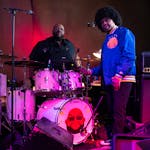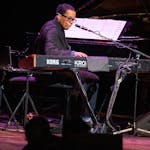When Prince showed up at his favorite Los Angeles recording studio, engineer Peggy McCreary never knew what was going to happen.
"It wasn't like you could ask him," she recalled. "He was very quiet. I got in his face: 'You're gonna have to talk to me. I can't work if you're just going to mumble instructions.' "
They worked together for six years, beginning in 1981, at Sunset Sound, recording "Controversy," "1999," "Purple Rain" and other projects.
That's where he cut many of the tracks on "Originals," a new posthumous album featuring his versions of songs he wrote for others. It is being released Friday, on what would have been his 61st birthday, by the Tidal streaming service (it will be available elsewhere June 21).
Ten of the 15 songs were written for women, including Sheila E., the Bangles, Martika, Jill Jones, Taja Sevelle and Apollonia 6. Others were for the Time, Mazarati and Kenny Rogers (yes, that "Gambler" guy).
"You never knew what he was working on or who it was for," McCreary said.
Some days, he'd walk in with lyrics handwritten on hotel stationery. Sometimes he'd scribble lyrics on the back of recording track sheets in the studio.
Only once did he explain a song — "Manic Monday," which the Bangles turned into a smash in 1986 (peaking at No. 2 behind Prince's own "Kiss").
Prince and McCreary had worked at Sunset Sound until 4 or 5 a.m. and were planning to return at 6 that evening.
"I got a call from the studio at 10 a.m. and they said he'd be in at 12 noon," McCreary remembered. "He waved some papers in my face and he said, 'If I dreamed another verse, I was coming in.'
"I said: 'You dream your songs?' He said, 'Sometimes.'
"I couldn't be mad at him even though I had only four hours of sleep."
They completed the song in one day.
Didn't make demos
Prince never recorded traditional demos, with his voice accompanied by just guitar or piano. Hearing the arrangements in his head, he cut fully produced songs that would become guides for the other singers to record them.
On "Originals," when Prince sings "Jungle Love" and "Gigolos Get Lonely, Too," you can appreciate how Morris Day tried to replicate Prince's phrasing on the Time's recordings (although he's not as passionate as Prince).
Ditto for "Nothing Compares 2 U," designed as a duet for the Family's St. Paul Peterson and Susannah Melvoin.
On some of the tunes intended for female singers, including "Noon Rendezvous" (Sheila E.) and the vaguely gospel "Love … Thy Will Be Done" (Martika), Prince uses his falsetto and girlish vocal tones.
For the slightly psychedelic "Manic Monday" and the lightly jazzy "You're My Love," the Kenny Rogers tune, Prince sings in his deeper voice. The latter tune stands out because it's so un-Princely — a conventional romantic pop ballad with a Brazilian undertone and a very committed vocal.
At times on "Originals," Prince seems experimental, especially on "Make-Up" for Vanity 6.
In the end, these studio recordings offer insight into the hyper-prolific, hyper-creative mind of Prince in the 1980s. (The only non-'80s number was Martika's, from 1991).
Relentless in the studio
In the studio, he was "kind of scary," opined McCreary, a self-taught engineer who has worked with Elton John, Van Halen, Toto, Tom Waits and others.
Sessions stretching 12 to 15 hours were the norm. Prince, a coffee drinker, wouldn't eat for fear it would make him tired. Once he and McCreary recorded for 24 hours straight.
"When Doves Cry," Prince's first big hit from 1984's "Purple Rain," was cut in 35 to 40 hours over two days.
"It was just overproduced," McCreary noted. "As the early morning hours were going on, he started taking things out. He took the synth out. At the end of the session, he took the bass out. I looked at him and he said: 'Nobody's going to believe I did this.' It was like 7 a.m. when he finished that song."
One time, he recorded an instrumental track and decided to call it a night. McCreary was required to document the tape for the studio and Warner Bros. Records, so as Prince was leaving, she asked him what to call it.
"He said, 'What's your middle name?' I said 'Colleen.' He said, 'Name it "Colleen." ' The song never got finished; it never had lyrics."
McCreary worked with Prince the morning in 1981 after he was booed off the stage in Los Angeles opening for the Rolling Stones. She was there late one night after a 1985 concert at the L.A. Forum that Madonna attended.
She joined him only a couple of times in Minneapolis, at a concert and a party.
In fact, she's never been to Paisley Park. When Prince built his Chanhassen studio complex in 1986, McCreary said he wanted her to relocate there. But she didn't hear from his people for a year, so she and her husband decided to stay in Los Angeles and raise a family.
Birthday present
On Jan. 11, 1982, it was McCreary's birthday, and she wasn't happy about spending it at Sunset Sound with Prince.
Usually dressed in his customarily stylish manner, Prince showed up this time with a completely different look: bluejeans, white T-shirt, black leather motorcycle jacket, black leather boots.
He cut a rockabilly song called "You're All I Want."
"It made sense because of the way he was dressed," McCreary said. "After working 12 hours, I made him a cassette. He was standing at the door and he tossed me the cassette and said, 'Happy birthday.' "
He gave her his jacket, too.
"I have an unreleased Prince song," she said. "For him, that was one of the greatest gifts he could have ever given me. At the time, I wanted my birthday off.
"That was him."
McCreary's assessment of the Purple One was similar to that of others who worked with him in his heyday.
"He was hard to work for. He was demanding. He was relentless," she said. "You had to be ready at any time for anything that inspired him. It was tough. I was on call whenever he was in California."
He never gave McCreary feedback. Never even offered hello, goodbye or thank you.
"I said: 'Do you like my work?'
"You're here, aren't you?" was Prince's response.
Said McCreary: "With one sentence, he could rip you to the bone."
Prince never bounced ideas off McCreary or anyone else. He never asked her opinion on anything musical.
Once, he caught her moving to the music and he laughed at her. Thereafter, she didn't react.
"We collaborated fairly nicely without much conversation about music," she said. "I got to have him at a really productive, prolific time. I got to watch him develop.
"He always knew who he was. Everybody else just needed to figure it out."
Twitter: @JonBream • 612-673-1719






